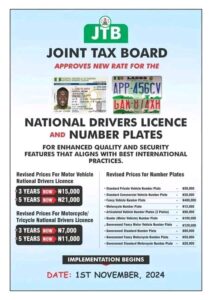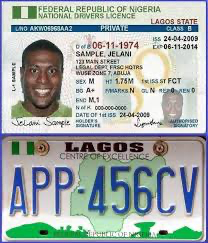The Federal Government of Nigeria has officially raised the cost of obtaining driving license and vehicle number plates, a decision that has sparked widespread reactions from citizens and stakeholders in the transportation sector. This move, which comes as part of the government’s efforts to generate more revenue and streamline regulatory processes, will see a significant hike in fees across various categories of licenses and plates.
Under the new pricing structure, motorists will now have to pay more to acquire or renew their driving licenses, with increases varying depending on the license category. Similarly, the cost of obtaining vehicle number plates has also been revised upward, affecting both private and commercial vehicle owners. These adjustments are expected to impact millions of road users nationwide, including new drivers, vehicle owners, and businesses relying on transportation.

The Federal Road Safety Corps (FRSC), which oversees the issuance of licenses and number plates, has explained that the price hike was necessary to cover rising operational costs and to improve the quality of service provided to road users. According to the FRSC, the increase will allow for better enforcement of traffic regulations, enhanced safety features on licenses and plates, and the implementation of more efficient processes to reduce delays and curb fraudulent activities.
Critics, however, have expressed concern over the timing and extent of the price increase, especially given the current economic challenges faced by many Nigerians. They argue that the higher fees may place an additional financial burden on citizens already grappling with the rising cost of living. Commercial drivers and transport companies, in particular, have voiced worries that the increased costs will ultimately be passed on to passengers, potentially leading to higher transportation fares across the country.
In response to these concerns, government officials have assured the public that the fee adjustments are part of broader reforms aimed at improving road safety, reducing accidents, and ensuring compliance with traffic regulations. They also noted that the increased revenue would be channeled into infrastructure development and enhancing the capacity of the FRSC to manage Nigeria’s growing road network.
As the new pricing structure takes effect, many Nigerians are waiting to see how the government balances the need for increased revenue with the potential impact on the public, especially those in the transport sector. The adjustment is expected to drive discussions on the affordability of essential services and the long-term benefits of a more regulated and safer transportation system.







